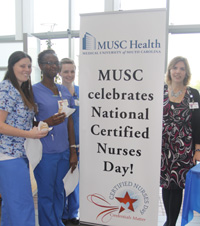|
by Lisa
Langdale, R.N., and Carla Pascoe,
R.N.
Magnet Structural Empowerment
Committee
More than 280
nurses were recognized for their
accomplishments at the National
Certified Nurses' Day event March
19.
Nurses have
attained certifications in the
following areas: nurse
practitioner, ambulatory care,
case management, oncology,
critical care, trauma, emergency,
wound care, nurse executive,
lactation, operating room,
neonatal, gastroenterology,
diabetes education, professional
development, transplant
coordinator and neuroscience.
 In honor of National
Certified Nurses Day, MUSC
celebrated the event with cupcakes
and credentialing information
March 19. In honor of National
Certified Nurses Day, MUSC
celebrated the event with cupcakes
and credentialing information
March 19.
The MUSC
medical center has embarked on a
journey to achieve the American
Nurses Credentialing Center's
(ANCC) Magnet designation. As the
nurses strive for excellence, a
goal has been established to
increase the number of certified
registered nurses by 5 percent
each year for the next two years.
To support this
goal, the medical center is
providing a certification
incentive with monetary assistance
for the initial and
recertification expenses of any
staff member seeking
certification. The incentive
covers review courses and
examination fees. The
recertification process requires
continuing education hours and, in
some instances, adequate practice
hours. The hospital also provides
free or discounted hours through
the Lowcountry Area Health
Education Center Consortium
membership.
Elizabeth
Grannell, R.N., has held a
national certification in
neuroscience nursing since 2008.
"I feel proud
to have a formal recognition of my
knowledge in my specialty.
Certification to me means that the
time, energy and passion that I
put into my career as a
neuroscience nurse is not only
recognized by my patients and
peers, it is also recognized on a
national level as well," she said.
Statistics from
ANCC show that hospitals with
Magnet designation and an
increased percentage of certified
nursing staff experience fewer
hospital-acquired infections, such
as central line associated blood
stream infections or ventilator
associated pneumonia, and have
fewer falls with harm or
hospital-acquired pressure ulcers.
These hospitals also have higher
patient and staff nurse
satisfaction and engagement
scores.
Sylvia Holmes,
R.N., believes a certified nurse
with specialized knowledge and
understanding exhibits a
confidence that translates into a
more effective environment with
better patient care outcomes.
"A CNRN
[certified neuroscience registered
nurse] certification will give me
a higher level of job satisfaction
and greater success in the field
of neuroscience nursing. Although
this will broaden my understanding
of neuro nursing, the
certification will also improve my
skills and enable me to give
quality care to my patients,
thereby placing all my patient
care first for the neurological
impaired patient," she said.
|



 In honor of National
Certified Nurses Day, MUSC
celebrated the event with cupcakes
and credentialing information
March 19.
In honor of National
Certified Nurses Day, MUSC
celebrated the event with cupcakes
and credentialing information
March 19.